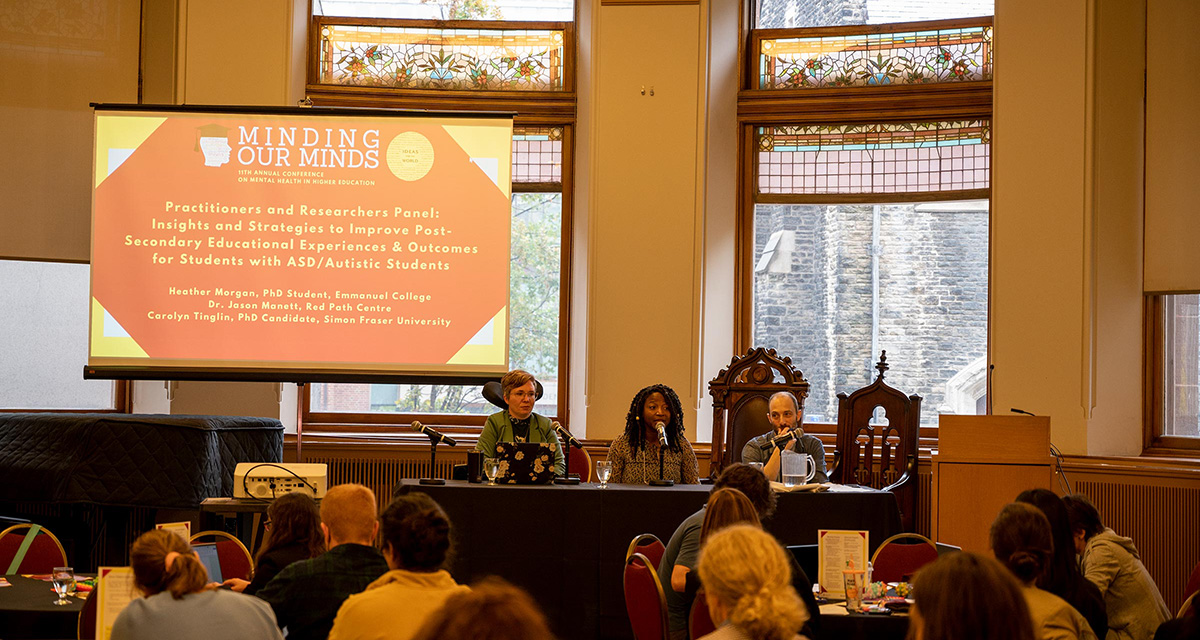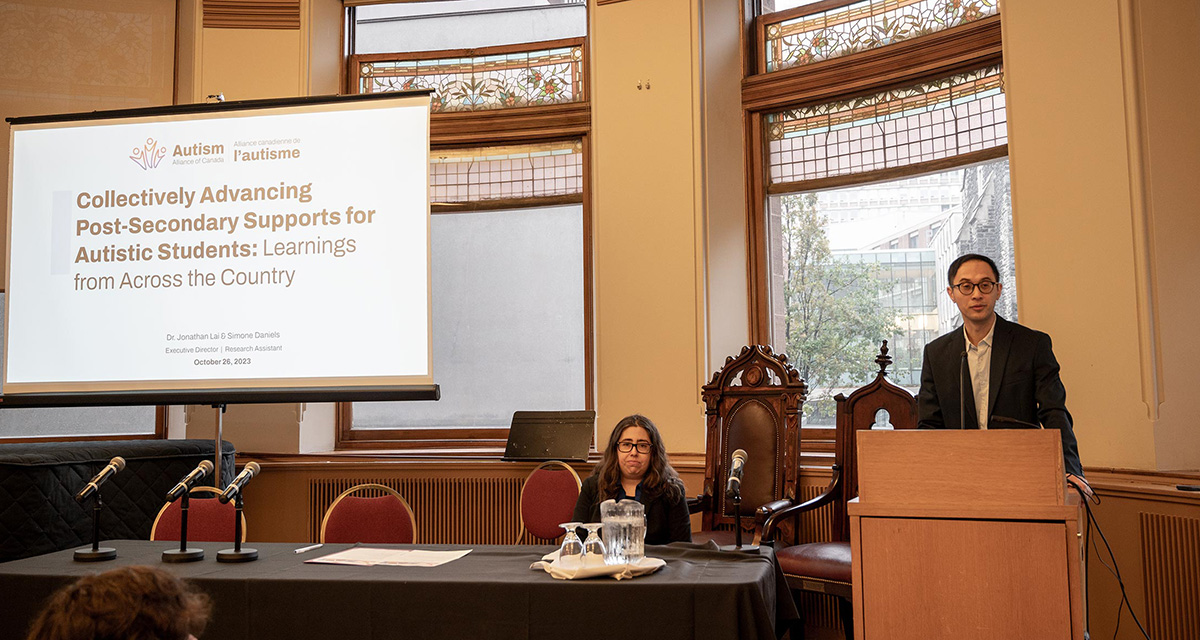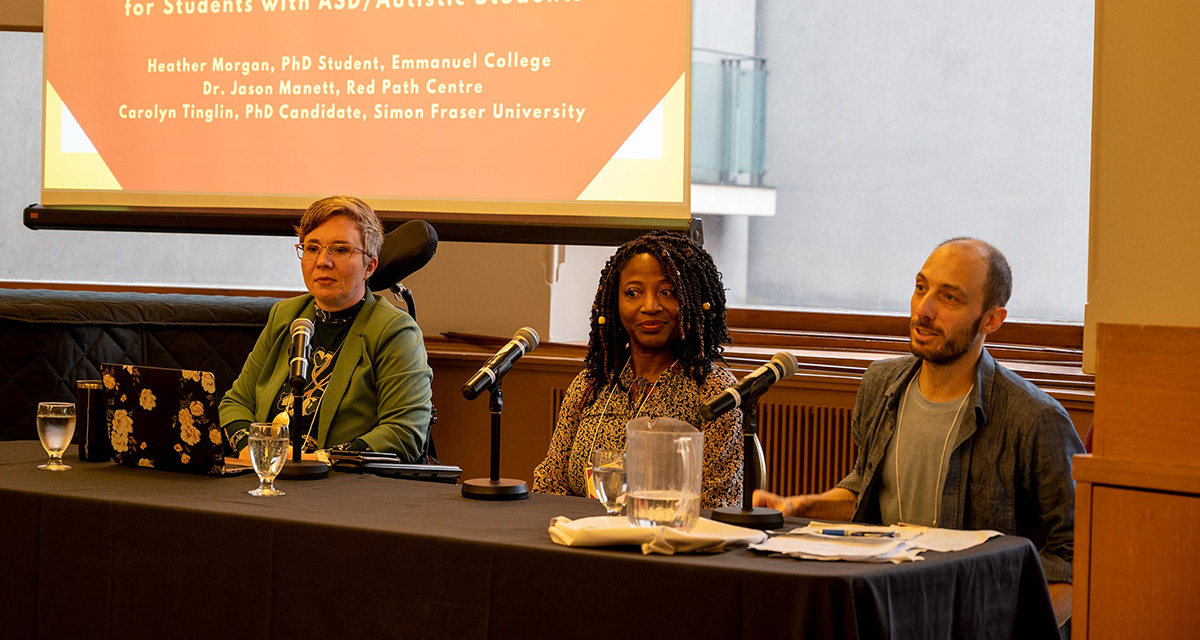Neurodiverse Voices Amplified at Minding Our Minds Conference

Now in its 11th year, Minding our Minds shines a spotlight on student health and wellness initiatives. This year's conference explored support for student neurodiversity. (Photo by Minh Truong)
By Dan Blackwell
Orientation week is a dream come true for many—but for some neurodiverse students, there’s a chance it’s initially “going to suck,” says first-year Lucas Marsh. Marsh identifies as having Asperger's syndrome, which he explains is part of autism spectrum disorder (ASD). The disorder can manifest in various ways, impacting a person’s sensory processing, social communication, task execution, and emotional and behavioural regulation. For some students like Marsh, the sights, sounds and social situations presented by orientation week can be overwhelming.
“You’re in this new environment, and you have this kind of internal pressure on yourself that you’ve got to make new friends and have all these great experiences at university,” says Marsh. “On top of all that, you also have Asperger’s. So, you know that you can mess something up socially and just ruin a situation.”
As one of the speakers on a student panel at last month's 11th annual “Minding Our Minds” conference, Marsh and others talked candidly about their experiences as neurodiverse students. The conference was organized by the Victoria College Office of the Dean of Students and Student Life Programs & Services at the University of Toronto, and was focused on gaining a better understanding of the neurodiverse student experience.
“I had a very fortunate experience in that I met someone who not only wanted to be my friend but also knew the ‘rules’ for making friends,” says Marsh about his first few weeks at Vic. The “rules” refer to the social norms and cues that are more easily grasped by non-ASD or “neurotypical” students, which Marsh says are something that many like him struggle with.
While his experiences are by no means universal, the challenges Marsh speaks of, along with the need to make university environments more accessible for students with ASD, were common themes throughout the conference’s various panel discussions. In addition to a student panel, Minding Our Minds featured experts from throughout the ASD community, including Accessibility Services' Taite Lehov, ASD support coordinator; Sabrina Paglia, accessibility advisor; and Irene Sullivan, neurological team lead.
The conference’s keynote address was delivered by Dr. Jonathan Lai, executive director of the Autism Alliance of Canada (AAC) and adjunct professor in the Dalla Lana School of Public Health, and Simone Daniels, a research assistant with AAC. Lai discussed the ongoing journey towards formulating a national autism strategy, and the urgent need to advance supports for the ASD post-secondary community. Daniels agreed, citing research that neurodiverse students face greater difficulties and challenges than their non-ASD peers.

Simone Daniels (L) and Dr. Jonathan Lai of the Autism Alliance of Canada discuss the need for a national autism strategy.
“Autistic post-secondary students require unique support needs in the areas of academics, social interaction, mental functioning, communication, sensory and executive functioning,” says Daniels. “They are also at risk of a range of negative outcomes, including experiencing social isolation and mental health issues, such as anxiety and depression, feeling undersupported and dropping out.”
Daniels says the needs of post-secondary students with ASD were a central focus at the Alliance’s recent Canadian Autism Leadership Summit. She highlighted studies showing that ASD-specific supports for post-secondary students were still lacking in most parts of the country.
While the University of Toronto provides various forms of support ranging from exam accommodations and support groups to assistive technology, fellow Minding our Minds panelist Dr. Jason Manett says there is always room for improvement. As an academic and life skills coach at The Redpath Centre, Manett says access continues to be an issue for many—yet opportunities for enhancing ASD accessibility can be as simple as course-related considerations.
“If there is one thing that I wish I could have, it would be that the syllabus proposal is shrunk,” he says. Currently, “it’s this massive collection of potential resources, considerations, procedures and links. What I'm finding is that students need to know ‘What’s the topic for the week?’ and ‘What’s the date?’ rather than the week number.”
Manett says he encourages faculty to think about how technology is implemented into their courses and to consider streamlining the ways in which students are evaluated. He also encourages staff and faculty to keep an open mind.
“Be open to the idea and not surprised if students have sensory issues, limited social endurance, possible social challenges…a desire for consistency and routine, and certainly preferences around communication,” he says.
This desire for consistency is something Marsh says is critical to his own ability to focus. Now living in residence at Vic, Marsh has had to adapt to many changes to his daily routines.
“The structure that I’m used to in my life and around school has kind of gone away,” he says. “That can make certain things very difficult. For example, when my day wasn’t structured around class, I would often forget to do things like eat, just because my brain had that tied to specific work cues.”
Marsh says he’s lucked out due to the friendships he’s formed at residence, which have helped him maintain healthy routines—and critically, stay true to himself.
“Part of having Asperger’s is learning to adapt socially, and to sculpt your personality in a way that makes it work better with the outside world,” says Marsh. “That's not always the healthiest response because it can lead to you changing bits of yourself that you might otherwise want to keep. I think to an extent it comes down to finding people who like the person you truly are.”

(L-R) Heather Morgan, Carolyn Tinglin and Dr. Jason Manett discuss various ways to improve the post-secondary educational experiences of students with ASD.
Fostering this kind of supportive community and creating safe spaces can go a long way for students with ASD, says Minding our Minds panelist Heather Morgan. A PhD student at Emmanuel College, Morgan has spent more than 20 years working in autism advocacy, activism and coaching. She says that creating a more welcoming environment for ASD students benefits everyone. She points to the “sensory cacophony” of modern-day lectures as just one example where small accessibility changes can benefit the entire university.
“Fluorescent lights. Echoing lecture theaters. Scraping or squeaking chairs. Strong perfumes. The list goes on and on,” says Morgan. “There is little escape from the intensity of these sensory issues, and few places to go where students can decompress between classes.”
For examples to follow, Morgan suggests looking to organizations like Google, which have created comfortable and accessible work environments. She also suggests hiring students with ASD to review syllabi and Quercus pages to help determine the clarity of messaging. “These don’t just benefit autistic students,” she says. “Everybody wins.”
Marsh agrees with the sentiment. He points to exam accommodations that would help neurotypical and neurodiverse students alike.
“Lots of people would benefit from certain aspects of accommodations that they might not otherwise fully consider themselves eligible for,” he says. “Just like people who aren’t deaf benefit from things like subtitles, I think there should be as few barriers to a student getting accommodations as possible.”
Marsh says that while he recognizes increasing access and reducing barriers may not be overnight fixes, other changes may be easier to address. He says orientation week is something that can easily be improved upon.
“Orientation was an amazing experience to meet people and make friends…I just wish there were more options,” he says. “I wish there were targeted neurodivergent events. We tend to connect better with each other socially than we do with neurotypical people.”
Another way to ease the transition to post-secondary studies may be to stagger orientation services, says Dr. Jonathan Lai. He suggests that allowing students time to settle into their new environment first may be a more effective way to help determine what types of support and services students need. As a result of these suggestions, the Victoria College Office of the Dean of Students, in cooperation with Accessibility Services and Hart House, will host a two-day reorientation event open to all neurodivergent students in January.
Events like these can offer neurodiverse students the opportunity to establish enduring and valuable connections, says Marsh, as can finding the right post-secondary environment.
“Colleges like Vic benefit ASD students in several ways. Vic is smaller, so there’s a greater sense of community,” says Marsh. “This makes making friends easier. I also think the diversity at Vic plays a role. People are used to different views and lifestyles, so they are generally very accepting of ASD."
Marsh adds that young people with ASD should consider post-secondary studies, even if it appears daunting at first.
“This university is huge, and you're going to meet other people like you,” he says. “You’re going to encounter friends, and if you’re lucky enough to major in something you’re passionate about, you’ll likely find someone else in your classes who is similar to you."
Navigating disability-related barriers can be challenging, but U of T’s Accessibility Services offers a wide range of supports to help you succeed. Learn more about Accessibility Services today.
